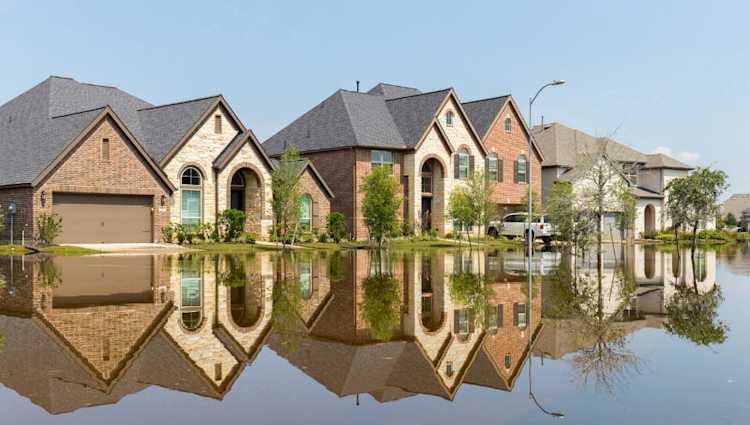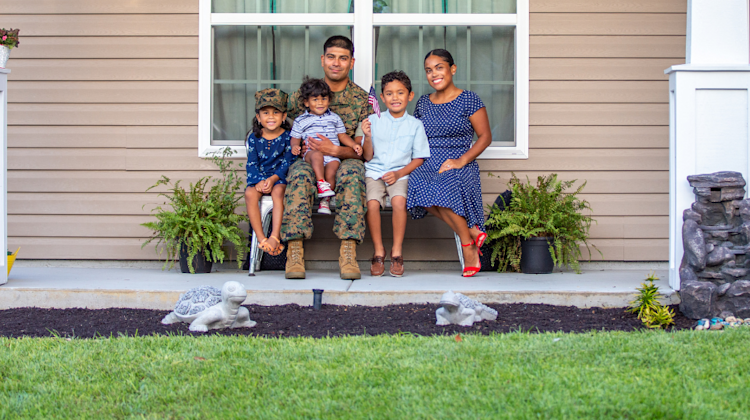Insurance When You Live Somewhere With Storms
by Lizann Lightfoot - June 24th, 2021

Military families can receive orders all over the country, often to states where they have never lived and aren’t familiar with the weather. Let’s be honest–some states are much more likely than others to have storms or weather conditions that could damage your home.
If you’re from the Midwest, you’ve probably experienced tornado warnings, but most likely haven’t dealt with a hurricane. If you’re from California, wild fires are a constant threat, but you might have no idea what’s covered during a flood.
Does this mean you shouldn’t buy a house at your next duty station if it’s in a storm zone? Of course not! It just means that before purchasing your home, you should research the local climate and understand what your homeowners insurance policy does–and doesn’t–cover.
These are important questions to discuss with an expert, such as your real estate agent and your insurance agent. So for this month’s expert interview, we spoke with Bryce Palmer, an AVP and Senior Insurance Specialist at Armed Forces Insurance (AFI). He has been in the insurance industry for 12 years, and with AFI for over 5 years, so he has experience helping military families make insurance choices. He has been a previous guest on our PCS Q& A webinars, so we naturally turned to him with our insurance questions.
Does each state set its own standards for homeowners insurance?
Palmer: Homeowners insurance is a policy that is all-encompassing: it covers the home that you own, any outside structures, and most personal property that you bring into the house. Everything you move into the home is covered under the homeowners insurance policy. A renter’s policy is designed for people who don’t own a home, to cover their personal belongings.
Generally, yes, homeowners insurance basic rules and coverage and policies are standardized throughout most of the country. There are coverage exceptions in certain areas: coastal zones can have exclusions based on the location risks. These areas may have higher deductibles, or exclude wind and hail, for example, where those are included elsewhere. You may have an expensive supplemental policy in addition to your standard homeowners policy.
What types of disaster insurance might be required?
Most homeowners policies will not include flood insurance. Basic standards do not include floods or earthquakes. If you live in a high-risk flood zone, your mortgage lender may require you to get a separate flood policy. Anyone can get that policy regardless of where they live, but if you are in a flood zone it may be required from the lender. This would be part of the policy. All lenders require hazard insurance–that means homeowners insurance.
If you need to know whether your property will require flood insurance, there is a website called FloodSmart.com that will give you information. On FEMA flood survey maps, you can look at your future duty station to determine if your property or neighborhood is a potential flood zone.
You can call an insurance company that works with the National Flood Insurance Program (NFIP), who can run your address through a system and let you know what flood mapping zone you are in, and they can give you a quote for a policy in that zone. Any agent who sells through NFIP must use consistent prices, so there is no need to price-shop from NFIP. Sometimes the private market offers different rates and packages for coverage.
What are the specific types of catastrophe insurance?
Fire: Lightning and fire are the most basic insurance events, so this is covered in all homeowners policies. In states with high wildfire zones, there are policies about defensible space. Make sure that you follow defensible space laws: clear out flammable materials to 100 feet from the building, or to the property line. If you have overhanging trees or brush close to the house, you are at risk of not having your policy renewed or approved later.
Ice or Snow: These are usually included in your general homeowners policy, so any damage from built up snow, frozen and burst pipes, etc. are all included in your homeowners policy.
Flood: Flood insurance applies when excess water from land that is normally dry enters your home. Damage from roof leaks falls under wind and hail coverage, while a pipe burst in a wall is the homeowners policy. In any area, there is always the potential for flood damage from excess rain or a storm surge. Anyone can get flood insurance, regardless of the level of risk for your property. Lower-risk zones will pay the most affordable rates. 25% of flood insurance claims in the past few years have come from houses in low-risk zones.
NFIP (National Flood Insurance Policy) does not usually exceed $250,000 for your home, or $100,000 for your personal property. Private insurance can offer additional coverage at different rates. This would work for hiring a cleanup company, replacing goods, and any repair costs up to that limit.
Storm (Wind and Hail): In some areas, wind and hail damage is included in the homeowners policy. Some states will require a 1% or more deductible for wind damage. In higher hurricane-risk zones, companies may exclude wind and hail damage from the homeowners policy. You would need to purchase a separate wind and hail policy, which can come from a state program or from private companies.
This will cover you for any damage in a storm–hurricane, tornado, hail, or thunderstorm (but not lightning, which is basic fire coverage). Because it’s a supplemental policy, they will usually ask to see your homeowners insurance policy, then they will match the policies to whatever you are paying for your homeowners value and your belongings as well.
Earthquake: This is not covered by homeowners, but in many states it can be added on as an endorsement, except for California. In California, there is a state program set up separately through the CEA (California Earthquake Association) but you have to request it as an additional policy and an additional cost above the homeowners policy. The cost is based on location, all dependent on the fault lines. For example, Riverside will be more expensive than San Diego.
Coverages and deductibles can vary. Earthquake deductibles begin at 5% of the home value. There are options for 10% or more of the home value, which are less expensive for monthly payments, but a much higher deductible. You can select whether it covers personal property, breakage, damage, etc. All these options will affect the price of the policy.
Volcano: Fire is covered under the home policy, but the earth movement from mud flows or earthquake are not. That would be covered under earthquake policy, whether or not a volcanic eruption caused it. Direct sudden damage to your home can be covered under volcanic insurance.
Hawaii has volcanic hazard zones, so you can look at a map to see the estimated risk for different areas. For insurance purposes there are two zones: 1 or 2. Your insurance company can let you know what zone you are in, and whether a company will write you a policy.
What research should a military family do when they get orders to a new area?
Find out what are the most common natural disasters. The biggest thing is to research your area and assess your risks from there. The higher the risk of storms or floods, the more expensive your policy will be, and the more exclusions your policy will have. Talk to your insurance agent about specific supplements to see what coverage makes the most sense to you.
Those choices can affect your price. Find a company that specializes in military moves, such as AFI. Someone who is familiar with the area can answer your questions and tell you details about the best place to live or the smartest decision to make to sure you are covered in a natural disaster.







